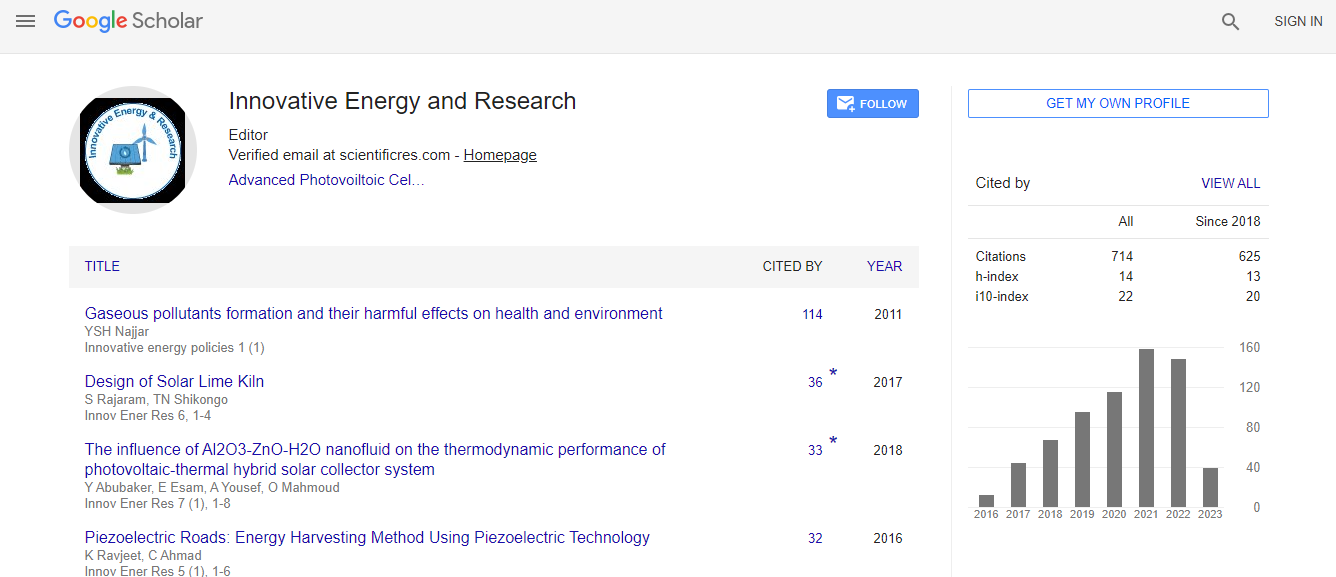Our Group organises 3000+ Global Conferenceseries Events every year across USA, Europe & Asia with support from 1000 more scientific Societies and Publishes 700+ Open Access Journals which contains over 50000 eminent personalities, reputed scientists as editorial board members.
Open Access Journals gaining more Readers and Citations
700 Journals and 15,000,000 Readers Each Journal is getting 25,000+ Readers
Google Scholar citation report
Citations : 712
Innovative Energy & Research received 712 citations as per Google Scholar report
Innovative Energy & Research peer review process verified at publons
Indexed In
- Google Scholar
- Open J Gate
- Genamics JournalSeek
- RefSeek
- Hamdard University
- EBSCO A-Z
- Publons
- Euro Pub
- ICMJE
Useful Links
Recommended Journals
Related Subjects
Share This Page
Comparison of the thermophysical properties of eutectic with peritectic compounds for thermal energy storage at high temperatures
20th International Conference on Advanced Energy Materials and Research
Fouzia Achchaq, Marie Duquesne, Elena Palomo del Barrio, Stefania Doppiu, Eric Lebraud and Philippe Legros
Universite de Bordeaux - CNRS, FranceBordeaux INP - CNRS, FranceCIC EnergiGUNE, SpainICMCB - CNRS, FrancePLACAMAT - CNRS, Franc
ScientificTracks Abstracts: Innov Ener Res
Abstract
The conventional resources depletion (coal, gas, oil) and the climate change lead to the need for innovation, requiring the use of renewable energy and appropriate storage technologies. This trend involves the development of effective, reliable and cost-effective energy storage units. Our work focus on advanced energy materials for ultra-compact thermal energy storage at high temperatures (300-600°C). Thus a theoretical study, based on both literature [1-3] and FactSage 7.0® software, is performed to compare the stoichiometric peritectic compounds with pure and eutectic ones currently considered (molten salts, metal alloys...). The objective is to know if the peritectics can surpass the performances of these latters. The theoretical results show that the stoichiometric peritectic compounds can provide, at constant temperature and ambient pressure, a potential energy density much higher than pure and eutectic materials. This is due to their capacity to combine all advantages provided by sensible, latent and thermochemical processes. No cutting-edge technology is required to be developped for using them, contrary to the thermochemical heat storage materials [4]. Moreover, we can envision also to use the peritectic compounds in cascade ways enabling hence a consideration of very wide ranges of temperature and energy density, making them applicable to a wider pan of applications. These encouraging results fully justify the choice of stoichiometric peritectic compounds. Now, several experimental attempts are launched to determine the appropriate methods and protocols to synthesize them. To date, our work leads to the successful synthesis of the peritectic compound based on LiOH-LiBr system. Recent Publications 1. Kenisarin M.M (2010) High-Temperature phase change materials for thermal energy storage. Renewable and Sustainable Energy Reviews 27:724-37. 2. Wei G, Wang G, Xu C, Ju X, Xing L, Du X, Yang Y (2018) Selection principles and thermophysical properties of high temperature phase change materials for thermal energy storage: A review. Renewable and Sustainable Energy Reviews 81:1771-86. 3. Reed S, Sugo H, Kisi E (2018) High temperature thermal storage materials with high energy density and conductivity. Solar Energy 163:307-14. 4. Achchaq F, Palomo del Barrio E (2017) A proposition of peritectic structures as candidates for thermal energy storage. Energy Procedia 139:346-51.Biography
Fouzia Achchaq is Associated Professor at the University of Bordeaux and Researcher at TREFLE Department (Fluids & Transfers) of the I2M Institute and a member of TESLab (Thermal Energy Storage Laboratory), I2M/Abengoa Joint Research Unit. She has expertise in thermal energy storage materials used at high temperatures and contributes to an ANR Project Pc2TES (National Project, 2017-2020).
E-mail: fouzia.achchaq@u-bordeaux.fr

 Spanish
Spanish  Chinese
Chinese  Russian
Russian  German
German  French
French  Japanese
Japanese  Portuguese
Portuguese  Hindi
Hindi 
